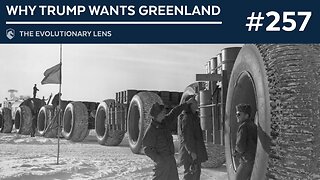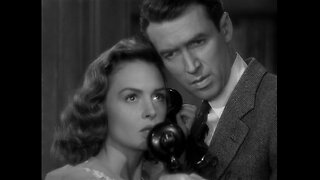Premium Only Content

Episode 1725: St John's writings on Christmas
St. John Chrysostom's "Homily on the Nativity of Christ":
This portion delves into the mystery of the Incarnation, expressing the awe and wonder of the event. St. John Chrysostom reflects on the divine nature of Christ and the profound reality that the Word became flesh while emphasizing the unchanging nature of the divine.
1. I behold a new and wondrous mystery.
I behold a new and wondrous mystery. My ears resound to the Shepherd’s song, piping no soft melody, but chanting full forth a heavenly hymn. The Angels sing. The Archangels blend their voice in harmony. The Cherubim hymn their joyful praise. The Seraphim exalt His glory. All join to praise this holy feast, beholding the Godhead here on earth and man in heaven. He Who is above, now for our redemption dwells here below; and he that was lowly is by divine mercy raised.
Bethlehem this day resembles heaven; hearing from the stars the singing of angelic voices; and in place of the sun, enfolds within itself on every side, the Sun of justice. And ask not how: for where God wills, the order of nature yields. For He willed; He had the power; He descended; He redeemed; all things yielded in obedience to God. This day He Who is, is Born; and He Who is, becomes what He was not. For when He was God, He became man; yet not departing from the Godhead that is His.
Nor yet by any loss of divinity became He man, nor through increase became He God from man; but being the Word He became flesh, His nature, because of impassability, remaining unchanged.
And so the kings have come, and they have seen the heavenly King that has come upon the earth, not bringing with Him Angels, nor Archangels, nor Thrones, nor Dominations, nor Powers, nor Principalities, but, treading a new and solitary path, He has come forth from a spotless womb.
Since this heavenly birth cannot be described, neither does His coming amongst us in these days permit of too curious scrutiny. Though I know that a Virgin this day gave birth, and I believe that God was begotten before all time, yet the manner of this generation I have learned to venerate in silence and I accept that this is not to be probed too curiously with wordy speech.
For with God we look not for the order of nature, but rest our faith in the power of Him who works.
What shall I say to you; what shall I tell you? I behold a Mother who has brought forth; I see a Child come to this light by birth. The manner of His conception I cannot comprehend.
Nature here rested, while the Will of God labored. O ineffable grace! The Only Begotten, Who is before all ages, Who cannot be touched or be perceived, Who is simple, without body, has now put on my body, that is visible and liable to corruption. For what reason? That coming amongst us he may teach us, and teaching, lead us by the hand to the things that men cannot see. For since men believe that the eyes are more trustworthy than the ears, they doubt of that which they do not see, and so He has deigned to show Himself in bodily presence, that He may remove all doubt.
And so, while sitting at table with His disciples, He speaks of His own flesh: "Take and eat; this is My body." And having first spoken thus, He afterwards took the cup, and said: "This is My blood." He gives His flesh and pours out His blood, and nothing is lacking for the growth of His children. O marvelous mystery!
On the Significance of Christ's Birth:
This segment reflects on the mysterious and profound nature of Christ's incarnation, emphasizing the dual nature of Christ as both divine and human. St. John Chrysostom encourages a recognition of the significance of Christ's birth in the context of the salvation offered to humanity.
Let the initiated understand the mystery of the economy; for where the cherubim know not how to pry, the dogs have known how to recognize. And how, it will be said, is it possible that the nature of Christ was unknown to the angels? I answer: "That which is beyond the flesh is invisible to the heavenly host." But He took the nature of man, who was free, and of a more noble form than the angels; and in His character as Man, He was not known to the angels who knew Him as God.
Let us glorify Him then, for He is in the flesh. But do not regard the flesh as mere flesh; for verily it is not mere flesh. "And the Word became flesh." Do not say "mere flesh." For when you see the Lord sacrificed, say that He is not mere flesh; for if so, He will be of no more value than the lamb; but He is greater many times over. Hence we must say that "The Word became flesh," in the same sense as "the Word became sin." "For He hath made Him to be sin for us, Who knew no sin." This is the flesh, this is the sacrifice.
Have a soul, then, that is noble, and a body that ministers to it, and in this life you will be blessed, and, after death, with the saints you will inherit eternal glory; for what belongs to the soul is more than what belongs to the body. Your body is living, but your soul is living also. And if the body is beautiful, when the soul is living, much more does the soul become beautiful when the body ministers to it.
"Virtue is of no value if the body is not present." This I say for the sake of those who attend in the hope of the resurrection. But if, when the body is absent, the virtue is not affected, and the soul, without the presence of the body, has so great beauty; much more shall it enjoy the advantage when the body ministers to it. Where the body is, it ministers to it, and its beauty is apparent; for the beauty of the soul is more pleasing when the body ministers to it.
If Christ had not come in the flesh, this misery of ours would not have been removed. What is this misery? The tyranny of the devil. Sin is the tyranny of the devil. If Christ had not come, sin would not have been blotted out. It is impossible, you say, for the wicked to be saved. What wicked? Do you mean those who have done ten thousand evil deeds? Even these may be saved. What wickedness is so great as the disobedience of the devil? Yet the Lord has promised, saying, "If ye will, ye shall be forgiven."
If Christ had not come in the flesh, if He had not borne our flesh, if He had not been crucified, these great benefits would not have occurred. What benefits? The overthrow of death, the blotting out of sin, the opening of heaven, the revealing of the Father. And then the giving of the Spirit, the adoption, the being made brethren, the being glorified. All these things were then brought about.
He came that He might destroy death, that He might overthrow the devil, that He might deliver us from this bondage. To all these points the Gospel testifies, and everything harmonizes with the Gospel. In the Gospel He says, "The time is fulfilled." The prophets were preaching, the captivity was at hand, and here comes He who was to bring relief, He who was to speak comfortably to Jerusalem.
But how shall He speak comfortably to Jerusalem? For Jerusalem is in the wilderness. Where shall we find Jerusalem? "And the desert shall rejoice and blossom as the rose." God says not "as a rose," but "as the rose," because there was but one and no more, and so He came. Jerusalem is in the wilderness, because the city is overthrown, because the people are captive. The forerunner goes before, that the way may be prepared for the coming of the King.
For this purpose He came, that the sheep might be saved. For this purpose He came, that He might gather them to Himself. For this purpose He came, that they might be one flock under one Shepherd. But what does He, the strong Shepherd? He lays down His life for the sheep. As the wolf, while he is able to destroy, keeps afar off; but when he sees the shepherd dead, he draws near. Not such a one is our Shepherd. He laid down His life for us.
On the Universal Joy of Christmas:
This section of the homily underscores the universal joy brought about by the birth of Christ. St. John Chrysostom calls for celebration and rejoicing among all people, regardless of their background or circumstances, as the Savior has come to bring redemption and joy to all
This is our present festival; it is this which we are celebrating today, the Coming of God to Man, that we might go forth, or rather (for this is the proper expression) that we might go back to God—that putting off the old man, we might put on the new; and that as we died in Adam, so we might live in Christ, being born with Christ and crucified with Him and buried with Him and rising with Him.
Let all then enter into His joy. You who are a sinner, enter into the joy of your Lord. You who are righteous, enter into the joy of your Lord. You who are weak, enter into the joy of your Lord. You who are strong, enter into the joy of your Lord. You who are vigilant, enter into the joy of your Lord. You who are slothful, enter into the joy of your Lord. You who have much, enter into the joy of your Lord. You who have little, enter into the joy of your Lord. The table is full; let all feast sumptuously. The calf is fatted; let none go away hungry.
Let no one bewail his poverty, for the universal Kingdom has been revealed. Let no one weep over his sins, for pardon has shown forth from the grave. Let no one fear death, for the Savior’s death has set us free.
He that was held prisoner of it has annihilated it. By descending into Hell, He made Hell captive. He embittered it when it tasted of His flesh. And Isaiah, foretelling this, cried: "Hell," he said, "was embittered when it encountered Thee in the lower regions." It was embittered, for it was abolished. It was embittered, for it was mocked. It was embittered, for it was purged. It was embittered, for it was despoiled. It was embittered, for it was bound in chains.
Dance, then, every tongue, to meet the Lord. Sing out, oh my soul! Rejoice, oh Jerusalem, for He that comes, from the dead, to thee is a little child. Rejoice, oh city of Christ, for the Lord of glory is born in thee. Sing, oh all mankind, for He that is in the Highest has visited those that are in the lowest. Speak, you angels in heaven, for a child, in the form of a servant, is born in a cave. Dance, oh every creature, for, behold, the Life of all the world is dead and in a grave!
Is there anyone who is a devout lover of God? Let them enjoy this beautiful bright festival! Is there anyone who is a grateful servant? Let them rejoice and enter into the joy of their Lord! Are there any weary with fasting? Let them now receive their wages! If any have toiled from the first hour, let them receive their due reward. If any have come after the third, let him with gratitude join in the Feast! And he that arrived after the sixth, let him not doubt; for he too shall sustain no loss. And if any delayed until the ninth, let him not hesitate, but let him come too. And he who arrived only at the eleventh hour, let him not be afraid by reason of his delay.
For the Master is gracious and receives the last even as the first; He gives rest to him that comes at the eleventh hour, just as to him who has toiled from the first. He has mercy upon the last and cares for the first; to the one He gives, and to the other He is gracious. He both honors the work and praises the intention.
Enter all of you, therefore, into the joy of our Lord, and, whether first or last, receive your reward. O rich and poor, one with another, dance for joy! O you ascetics and you negligent, celebrate the day! You that have fasted and you that have disregarded the fast, rejoice today! The table is rich-laden; feast royally, all of you!
The calf is fatted; let no one go forth hungry! Let all partake of the Feast of Faith. Let all receive the riches of goodness. Let no one lament their poverty, for the universal Kingdom has been revealed. Let no one mourn their transgressions, for pardon has dawned from the grave. Let no one fear death, for the Savior’s death has set us free.
Bethlehem, the city of David, is an ancient city, and it is adorned now as a bride. And why? The Bridegroom is coming forth from the womb, and He clothes Himself in the flesh.
Bethlehem, go forth to meet Him, receive Him, and be not ashamed, for your nakedness shall not be seen. Put on the garment that cannot be taken away, and which the fire cannot consume. The nakedness of all has been made manifest, but the righteousness of the Bridegroom has covered all.
Bethlehem, rejoice, for He who is the salvation of the world is born. Bethlehem, rejoice, for He has opened Paradise. Bethlehem, rejoice, for the curse is destroyed. Bethlehem, rejoice, for grace has been revealed. Bethlehem, rejoice, for the night is lighted up. Bethlehem, rejoice, for the things above have been manifested upon the earth. Bethlehem, rejoice, for the invisible has been seen.
Bethlehem, rejoice, for what was far off has been brought near. Bethlehem, rejoice, for you have received a Babe from the Virgin. Bethlehem, rejoice, for the Birth of Christ is the birth of the Savior. Bethlehem, rejoice, for the earth is filled with joy. Bethlehem, rejoice, for we have come to the substance. Bethlehem, rejoice, for we have come to the shadow.
Bethlehem, rejoice, for the tree of life has blossomed forth in the cave. Bethlehem, rejoice, for we shall enjoy the fragrance of Paradise. Bethlehem, rejoice, for you are the city of the life-giving Bread. Bethlehem, rejoice, for you are the dwelling place of the Word. Bethlehem, rejoice, for in you the invisible One has been seen.
Bethlehem, rejoice, for you shall hear the angels singing in the heavens. Bethlehem, rejoice, for you shall see the Wise Men bearing gifts. Bethlehem, rejoice, for you shall see the Magi offering worship. Bethlehem, rejoice, for the shepherds shall stand in amazement. Bethlehem, rejoice, for the Creator has come forth as a little child.
Bethlehem, rejoice, for you shall see a small cave containing the Uncontainable God. Bethlehem, rejoice, for in a manger you shall see Him who feeds irrational animals with His own hand. Bethlehem, rejoice, for the Master has become a servant. Bethlehem, rejoice, for you have received Christ, the Son of God. Bethlehem, rejoice, for with you He has made His dwelling.
What shall we answer to those who speak against the Church, and say that she rejoices, not in what is good, but in what is offensive? For the whole Church rejoices not in what is offensive, but in what is good.
"And the shepherds returned, glorifying and praising God." Seest thou how both angels and men made a choir? The angels say, "Glory to God in the highest," and the shepherds, "on earth peace, goodwill among men." A splendid choir, that of angels and men, a joyful choir, a heavenly and an earthly choir. They said, "on earth peace, goodwill among men." And do thou say, "Glory to God in the highest."
"For unto you is born this day a Savior, which is Christ the Lord." Now in very truth great is the mystery, great the gift. Heavens were opened, the choirs of angels came down, they descended from on high, and earth rendered up a heavenly sound.
But what say they? "Glory to God in the highest, and on earth peace, goodwill among men." Wherefore are we called men of goodwill? Because God wills that peace should be on earth, and among men there should be good-will. He has good-will to us; let us also have good-will to one another. He cherishes us; let us also cherish one another.
The angels sing, the shepherds sing, the angels sing, the saints in Bethlehem sing, and men sing here. "Glory to God in the highest, and on earth peace, goodwill among men." To God there belongs glory, to men peace, to angels good-will. For how should angels not wish good-will to men, when for their sake so many things have been done? They that were present said, "Glory to God in the highest, and on earth peace, goodwill among men."
And the shepherds glorified God; and why? What had they seen? A babe wrapped in swaddling clothes, and lying in a manger. "And when they had seen it," it is said, "they made known abroad the saying which was told them concerning this child." They ran round about the whole city, and published the matter concerning that which had been wrought. What had been wrought? A virgin had given birth to a child; so that the words of the prophet were fulfilled.
Again, I will say, a virgin gave birth to a child, and so she became both mother and virgin. Who ever heard of such a thing? Who ever heard of a woman being a mother, and remaining a virgin? I say not, remaining a virgin after her child-birth; but remaining a virgin even before her child-birth. The thing surpassed the might of nature; nay, I had almost said, it was contrary to nature. A virgin and a mother; a mother because a virgin. A mother because a virgin? Therefore she brought forth, because she was a virgin. Therefore she brought forth without pain, because she was a virgin.
Do not wonder that the world was silent. The world was silent, and observed an unwonted peace, because the King was come. Nay, it did not observe even this peace, for Herod troubled it. He who troubled the peace of the world, could not succeed in making it known; but they who kept their own peace, made it known. "The angels came and sang;" the shepherds heard and published the song. He who was troubled has not made it known; they who were not troubled, published it. "The shepherds returned, glorifying God." In other words, they published abroad what had been told them. They sang the song, they made it widely known.
But, as for this, it was a joyful season. The multitude was silent, the city quiet, when the babe was born. Justly indeed did the city hold her peace. For what had been done, was a thing that passed man's understanding. A virgin had given birth to a child, and the child was Christ the Lord. She who knew not a husband, bore a son. The angels sang the hymn; the archangels sang, the cherubim and seraphim sang, angels and men sang, the living and the dead sang.
What shall we say, brethren? He that was the friend of publicans and sinners has come and led them to a higher friendship. He that has banished from the fold the sheep that had strayed has come to seek after it. He that has sought it has bound it on His shoulders, rejoicing. He that was poor has come to make the world rich. He that is the giver of gifts has come to bring to all men the grace of the Spirit. He that was destitute has come to minister to our poverty.
For this cause, then, the Word came down from heaven to raise us up. He that is heavenly and everlasting has assumed the form of the earthly and temporal, in order that, by making the earthly heavenly, He might render us worthy of receiving the Spirit. He, the only begotten, has come to make us adopted children. The Master of all has come to be a servant. He that is without flesh has assumed flesh, in order that He might restore to us what we had lost, I mean the royal image. He has come in poverty, that He might bring us to the possession of riches.
Do you not see the first-fruits of the grace of the Spirit in the Magi? They were strangers and foreigners, yet they were admitted to the adoption of sons. They had not seen Christ, but a star had revealed Him to them. They had not seen Mary, but they sought after her and worshipped her. And if they went into the house and saw a child on His mother's bosom, they were moved with exceeding great joy. And yet He did not shine forth as He will shine forth in the future, but appeared in lowliness, a babe like other babes, with nothing to distinguish Him.
Yet they did not doubt that He was the Lord of heaven and earth. They did not doubt that He was the King of kings, but they worshipped Him with faith unfeigned. And though they saw Him in a lowly form, they confessed His royal dignity. And this was the effect of the grace of the Spirit, that they sought after things lowly, and found things heavenly.
These things have been said to stir up your minds and to admonish you to have regard to the grace of the Spirit. Let us, then, give heed to ourselves. Let us not be anxious about possessions, that we may not be accused of having regard to our wealth. Let us not be anxious about riches, that we may not be accused of having regard to our money. Let us not be anxious about carnal beauty, that we may not be accused of having regard to our bodies.
If you have possessions, cast them from you, that you may obtain possessions that are everlasting. If you have money, lose it, that you may not lose your soul. If you have a beautiful body, lose it, that you may gain a beautiful form. For the glory of the flesh is the shame of the soul. Let us therefore be anxious about nothing, save only about our soul, to guard it against sins, to keep it pure from defilement.
-
 1:23:41
1:23:41
Game On!
18 hours ago $5.21 earnedNetflix NFL Christmas Games Preview and Predictions!
29K5 -
 2:05:07
2:05:07
Darkhorse Podcast
22 hours agoWhy Trump Wants Greenland: The 257th Evolutionary Lens with Bret Weinstein and Heather Heying
265K423 -
 8:50:58
8:50:58
Right Side Broadcasting Network
22 hours ago🎅 LIVE: Tracking Santa on Christmas Eve 2024 NORAD Santa Tracker 🎅
289K39 -
 2:48
2:48
Steven Crowder
1 day agoCROWDER CLASSICS: What’s This? | Nightmare Before Kwanzaa (Nightmare Before Christmas Parody)
271K12 -
 33:49
33:49
Quite Frankly
22 hours agoThe Christmas Eve Midnight Telethon
83.6K11 -
 2:12:46
2:12:46
Price of Reason
21 hours agoAmber Heard BACKS Blake Lively Lawsuit Against Justin Baldoni! Is Disney CEO Bob Iger in TROUBLE?
44.6K13 -
 1:01:17
1:01:17
The StoneZONE with Roger Stone
16 hours agoChristmas Edition: Why the Panama Canal is Part of the America First Agenda | The StoneZONE
117K46 -
 18:12:15
18:12:15
LFA TV
1 day agoLFA TV CHRISTMAS EVE REPLAY
133K14 -
 13:32
13:32
Scammer Payback
17 hours agoChanging the Scammer's Desktop Background to his Location
6.35K3 -
 4:21
4:21
BIG NEM
19 hours agoNikola Tesla's Secret to Cultivating Creativity & Genius
4.14K1